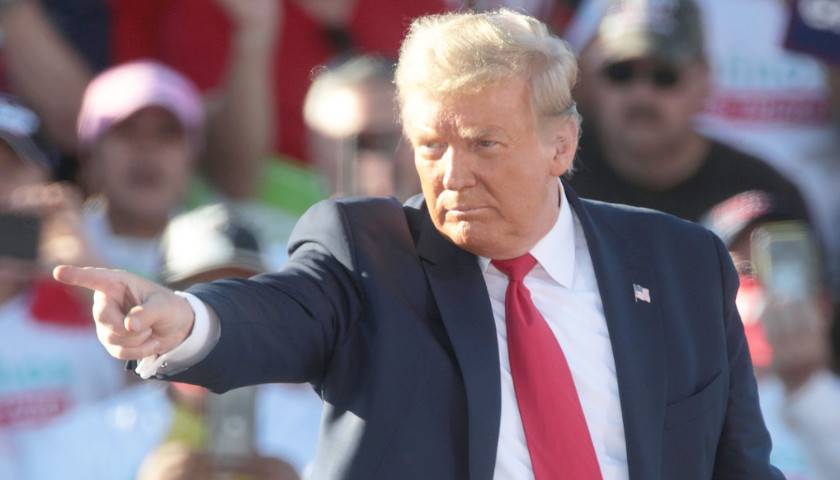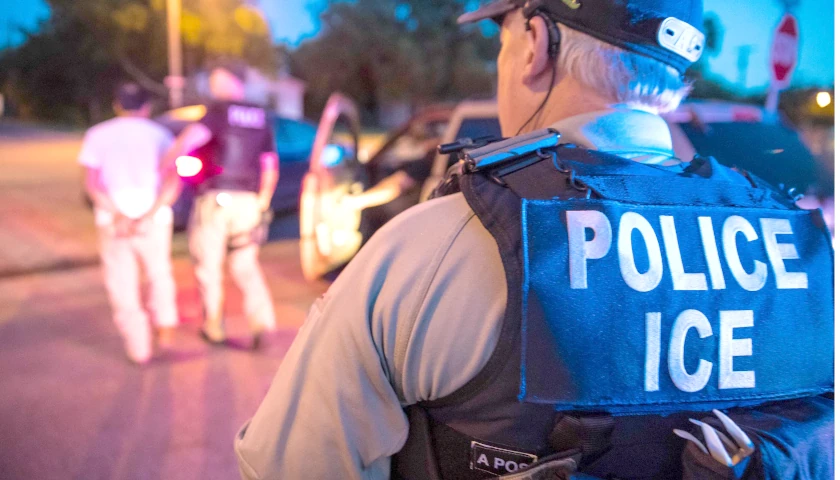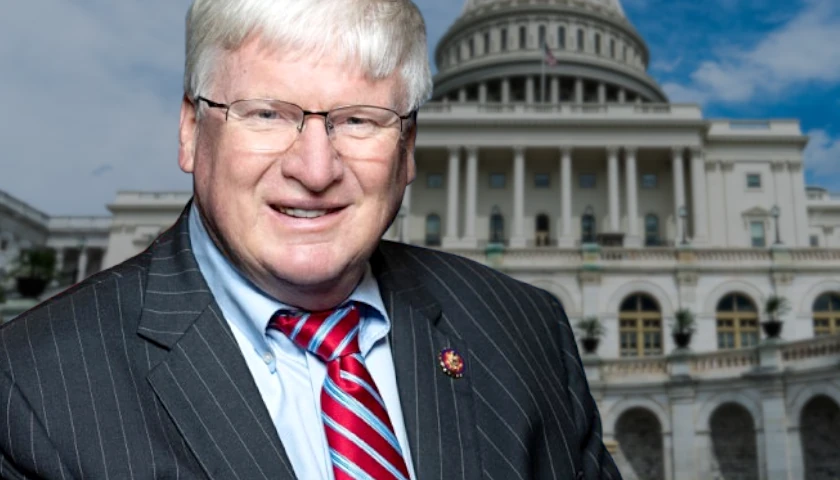by Robert Romano
Fight fire with fire.
That was the message of former President Donald Trump to his supporters in Bedminster, N.J. on June 13 following his arraignment in federal court in Miami, Florida for alleged violations of the Espionage Act over documents that Trump retained following his presidency that he says he declassified, warning that the “seal is broken.”
Trump declared he would in turn appoint a special prosecutor to go after President Joe Biden, whom he blamed for the indictment, “In addition to closing the border and removing all of the criminal elements that have illegally invaded our country, making America energy independent and even dominant again, and immediately ending the war between Russia and Ukraine — I will have it ended in 24 hours — I will appoint a real special prosecutor to go after the most corrupt president in the history of the United States of America, Joe Biden, and the entire Biden crime family, name a special prosecutor, and all others involved with the destruction of our elections, our borders and our country itself.”
Trump said that a line had been crossed that never should have been, stating, “Now that the seal is broken, so important… the seal is broken by what they’ve done, they should never have done this. This was an unwritten rule: you just don’t, unless it’s really bad, but you just don’t. But the seal’s now broken.”
And surely it has been. Never before has a former president or presidential candidate—Trump is running for reelection again in 2024 after losing in 2020 to Biden—been brought up on federal criminal charges by his political opponent’s administration. And certainly not for something presidents have the power to do both under their Article II power to declassify documents related to their administration and under the Presidential Records Act to retain that information.
Presidents have the power to execute the laws as well, being the unitary executive under Article II, including to direct the Justice Department, established by law, to investigate and prosecute offenses of federal crimes. But not to arrest their political opponents for things they had a right to do under the law.
In his speech, Trump quoted the 2012 decision by U.S. District Judge of the District of Columbia, Amy Berman Jackson, which stated, “the President enjoys unconstrained authority to make decisions regarding the disposal of documents: ‘[a]lthough the President must notify the Archivist before disposing of records … neither the Archivist nor Congress has the authority to veto the President’s disposal decision.’ Id., citing H.R. Rep. No. 95–1487, at 13 (1978), reprinted in 1978 U.S.C.C.A.N. at 5744.”
The decision continued, “Since the President is completely entrusted with the management and even the disposal of Presidential records during his time in office, it would be difficult for this Court to conclude that Congress intended that he would have less authority to do what he pleases with what he considers to be his personal records.”
As for which records are classified, that was up to former President Trump as well, right up until the time he left office. In 1988, in Department of Navy v. Egan, the U.S. Supreme Court clarified that the President’s authority over classification derives from his implicit executive powers, and not any Congressional statute: “The President, after all, is the ‘Commander in Chief of the Army and Navy of the United States.’ U.S. Const., Art. II, 2. His authority to classify and control access to information bearing on national security and to determine whether an individual is sufficiently trustworthy to occupy a position in the Executive Branch that will give that person access to such information flows primarily from this constitutional investment of power in the President and exists quite apart from any explicit congressional grant.”
So, if Trump said the documents were declassified, they were declassified.
That should be the end of the story. A curiosity arises in whether Biden then attempted to reclassify the documents in question, a potential situation of legal “backsies.” But once out in the open, there seems to be a doctrine of “no backsies” which it comes to the documents that the President takes with him upon leaving office, since it cannot have been either the Framers’ intent nor Congress’ to create a situation of potential legal entrapment when members of what would often be opposing parties are either ousted from office via an election or serve out their terms.
As for which records might still belong in the archives, which ones were personal and which ones were presidential records, that is simply a civil matter, that could and should be handled in federal civil courts, and is not a criminal matter that should now be decided for the first time in U.S. history by a trial jury. There is no allegation in the indictment that Trump destroyed any records. In this case, Special Counsel Jack Smith has made a crime out of Trump going through the motions of civil litigation, claiming obstruction of justice for something Trump had a right to do: To challenge National Archives and Record Administration’s contentions about which records it should retain.
And since the President’s acts under Article II to dispose of his administration’s documents are a political matter with which the president has discretion, as in 1803’s Marbury v. Madison, courts have no jurisdiction. It’s not justiciable. And yet here we are, in a constitutional crisis, created by Special Counsel Smith, Attorney General Merrick Garland and, yes, President Biden, who had the power to stop a politically motivated prosecution against the GOP frontrunner.
That’s not what America does. That’s what tyrants do. And yet, how do you stop it? How do you put the genie back in the bottle?
Here, Trump is saying you don’t. You can’t. “The seal is broken,” he says.
In truth, this is not unfamiliar territory for the former president. In 2016, before he ever took officeat the Republican National Convention, Trump initially rejected the convention’s chants of “lock her up” referring to Hillary Clinton’s keeping classified documents on her private server at home and instead implored “Let’s defeat her in November.”
But by the time he got to the second presidential debate against Clinton in Oct. 2016, he threatened to do the same thing to her: “I tell you what, I didn’t think I would say this, but I’m going to and I hate to say it. But if I win, I am going to instruct my attorney general to get a special prosecutor to look into your situation. Because there has never been so many lies, so much deception. There has never been anything like it. And we’re gonna have a special prosecutor.”
Of course, he never did. A few months into office, Trump’s Attorney General Jeff Sessions recused himself upon discovery that the top secret Russiagate investigation, falsely alleging Trump was a Russian agent and that he and his campaign had conspired with Moscow to hack the Democratic National Committee and put their email onto Wikileaks, using fake information conjured by the Clinton campaign and the DNC, had carried over from the Trump campaign and transition into the Trump administration after he took office.
And that’s the vicious cycle. When Clinton was under FBI investigation over her keeping classified emails on a private server because she was lazy and wanted to receive national security information on her smart phone. With the FBI investigation as a specter over her campaign, her campaign sought to get a Justice Department against her opponent to even things out.
Similarly, the charges were brought against Trump just as a June 30, 2020 FD-1023 alleging a $5 million bribe to Biden from his time as Vice President in 2015 and 2016, that was generated based on information generated in 2017, was being brought to light by Congressional Republicans. According to the House Oversight Committee’s Twitter account, “The FD-1023 was generated by the FBI on 6/30/20 based on another FBI record from 2017.” Reportedly, it implicates Biden’s son, Hunter, who was hired by Ukrainian natural gas company Burisma founder Mykola Zlochevsky in April 2014. Zlochevksy was a Viktor Yanukovych administration official who that year had $23 million worth of assets frozen in a corruption investigation and fled the country that year. Hunter Biden continued on the board at the company.
Ukraine’s prosecutor general, Viktor Shokin was fired in 2016 when Biden threatened then-Ukrainian President Petro Poroshenko with $1.2 billion of loan guarantees if the firing was not completed, with Biden bragging to the Council on Foreign Relations in 2018 that Shokin was fired the same day. Shokin said he was investigating a natural gas firm, Burisma Holdings, who Biden’s son, Hunter, served on the board of directors of and that that’s why he was fired.
And so to even the score, as these corrupt matters were being brought to light, the Biden administration then brings charges against Trump for things Trump had the power and right do while he was president, in one of the most egregious abuses of power by a president ever. House Democrats impeached Trump in 2019 for even talking about investigating Biden and these Ukraine matters—which have brought the world to the brink of World War III and nuclear annihilation—with Ukrainian President Volodymyr Zelensky.
To be certain, the First Article against Trump stated he was allegedly “soliciting the Government of Ukraine to publicly announce investigations that would benefit his reelection, harm the election prospects of a political opponent, and influence the 2020 United States Presidential election to his advantage… President Trump—acting both directly and through his agents within and outside the United States Government—corruptly solicited the Government of Ukraine to publicly announce investigations into… a political opponent, former Vice President Joseph R. Biden, Jr…”
In the transcript between former President Trump and Ukrainian President Volodymyr Zelensky on July 25, 2019, all Trump said was “The other thing, there’s a lot of talk about Biden’s son, that Biden stopped the prosecution and a lot of people want to find out about that so whatever you can do with the Attorney General would be great. Biden went around bragging that he stopped the prosecution so if you can look into it … It sounds horrible to me.”
Now, carrying on international relations with Ukraine and even conducting an investigation about corruption related to U.S. officials is certainly within the province of the President’s powers. Was Biden authorized by former President Barack Obama, who had appointed him as a regional governor of Ukraine, to get the Ukrainian prosecutor removed? Was Hunter Biden acting as an agent of the U.S. to get the former Yanukovych administration official removed? Or were they privately trying to protect Zlochevsky? All good questions for a president to consider as the U.S. sought to avoid war in the region.
And yet, like Clinton, there was no prosecution ever brought against Biden by Trump. That’s a major difference. Maybe the Bidens were fully authorized to act on behalf of the United States by former President Obama at the time.
In fact, the civil war in Ukraine that began in 2014 actually started out as a policy disagreement over a pair of competing trade agreements with the European Union and Russia, according to Biden in his book, “Promise Me, Dad: A Year of Hope, Hardship, and Purpose,” published in 2017. “A popular demonstration,” Biden wrote, “which started at a square in Kyiv in late 2013, when President Viktor Yanukovych reneged on his promise to take the country into the European Union, had grown from a spontaneous eruption to a real political movement — one President Yanukovych mishandled badly.”
Here, Biden is referring to the pro-Europe, anti-Russia trade agreement, the Ukraine–European Union Association Agreement. It was a trade deal Yanukovych’s then-adviser Paul Manafort had advised him to adopt, but in 2013, he rejected Manafort’s advice, pulling out of the deal. What followed was a revolution in Ukraine that ultimately ousted Yanukovych from power in 2014, embroiling Ukraine in civil war that led directly to the annexation of Crimea by Russia and several separatist uprisings in eastern Ukraine. Yanukovych then fled to Russia on Feb. 22, 2014, and the trade deal was signed in March 2014 by interim Prime Minister Arseniy Yatsenyuk.
By Biden’s account, it was his pressure that prompted Yanukovych to flee: “I made the last of many urgent calls to Yanukovych in late February of 2014, when his snipers were assassinating Ukrainian citizens by the dozens and we had credible reports that he was contemplating an even more vicious crackdown. I had been warning him for months to exercise restraint in dealing with his citizens, but on this night, three months into the demonstrations, I was telling him it was over; time for him to call off his gunmen and walk away. His only real supporters were his political patrons and his operators in the Kremlin, I reminded him, and he shouldn’t expect his Russian friends to rescue him from this disaster. Yanukovych had lost the confidence of the Ukrainian people, I said, and he was going to be judged harshly by history if he kept killing them. The disgraced president fled Ukraine the next day…”
In the months that followed, former Yanukovych officials, including Zlochevsky, who hired Hunter Biden at Burisma in April 2014, would be pursued by the Ukrainian government. It is entirely possible that was all a part of U.S. policy. But it is also possible that it was not, and that the Bidens were exploiting the situation and enriching themselves while the world hurdled towards war.
Trump, for his part, vowed to take on these powerful forces if he gets back into the White House, stating, “They’re destroying our country. And when I’m re-elected and we will get reelected — we have no choice, we’re not going to have a country anymore — I will totally obliterate the Deep State, we will obliterate the deep state, and we know who they are, I know exactly who they are. They want to take away my freedom because I will never let them take away your freedoms, very simple. They want to silence me because I will never let them silence you. They want you silent. And I am the only one that can save this nation because you know they’re not coming after me, they’re coming after you, and I just happen to be standing in their way — and I will never be moving.”
Undoubtedly, this will all become the subject of impeachment proceedings by the Republican-led House of Representatives, that is, if Republicans have any sense of self preservation and believe that President Biden and the executive branch have no power to prosecute a former president for his valid, constitutional and legal acts as president—an important principle to defend.
“The seal is broken,” after all. The question is how to put the civil society back together after all of this — Trump says he will enforce the laws while Biden claims the same — or whether it has already been lost for another millennium or two.
– – –
Robert Romano is the Vice President of Public Policy at Americans for Limited Government Foundation.
Photo “Donald Trump” by Gage Skidmore. CC BY-SA 2.0.




